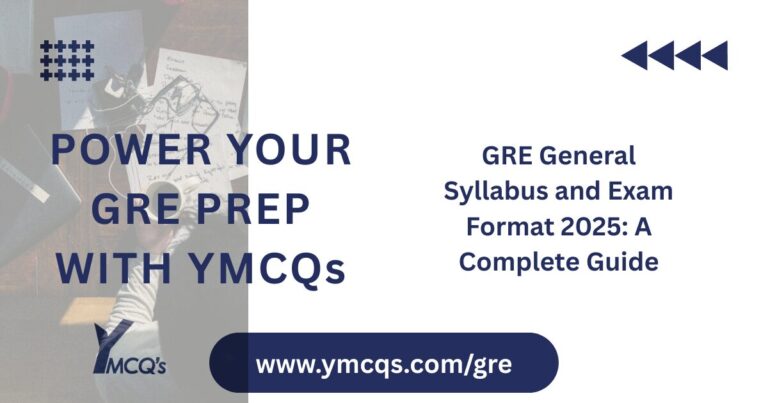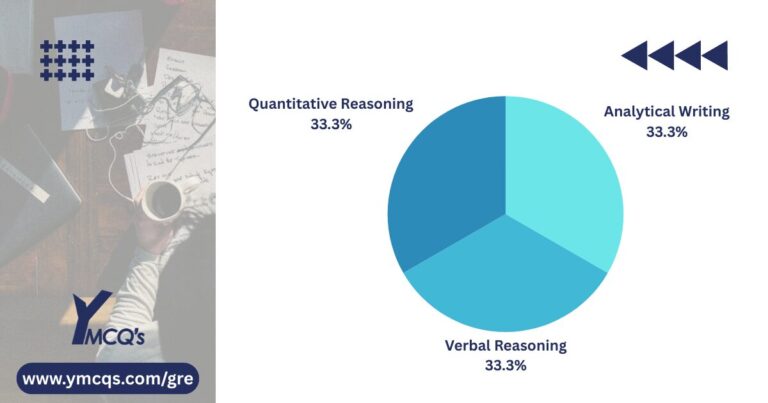GRE General Syllabus and Exam Format 2025: A Complete Guide
- SW Solutions Ltd

The GRE, or Graduate Record Examination, is a standardized test widely taken by students to get admission into graduate and business schools worldwide, particularly in the United States, Canada, and Europe. The highest number of candidates appearing for the GRE were from India, the USA, and China. It is a computer-based adaptive test that evaluates the analytical, verbal, and quantitative reasoning skills of test takers. Test-takers must stay updated on any minor adjustments in question patterns, scoring, and test-taking strategies for higher score in the GRE.
This article provides a comprehensive breakdown of the GRE exam format for 2025, including section-wise details, scoring mechanisms, and preparation tips to help GRE aspirants achieve their target score.
GRE Exam Format 2025: Overview
The GRE General Test consists of three main sections:
- Analytical Writing
- Verbal Reasoning
- Quantitative Reasoning
Moreover, the ETS testing may include an unscored research section for research purposes of the company. After the removal of the Analyze an Argument task in 2023, the exam duration has been shortened to approximately 1 hour and 58 minutes from 3 hours and 45 minutes.
1. Analytical Writing (1 Task – 30 Minutes)
- Task: “Analyze an Issue” (Essay)
- Objective: Evaluate the test-taker’s ability to articulate complex ideas, provide evidence-based arguments, and maintain coherent writing.
- Scoring: 0-6 (in half-point increments)
Key Changes (2025):
- Only one essay task remains (previously two).
- Focus on real-world argumentation rather than abstract analysis.
2. Verbal Reasoning (2 Sections – 27 Questions Total, 41 Minutes)
This section assesses reading comprehension, text completion, and sentence equivalence.
- Section 1 (12 Questions – 18 Minutes)
- Section 2 (15 Questions – 23 Minutes)
Question Types:
✔ Reading Comprehension (50% weightage)
✔ Text Completion (Fill in the blanks with appropriate vocabulary)
✔ Sentence Equivalence (Select two words that best complete a sentence)
Scoring: 130-170 (in 1-point increments)
Key Changes (2025):
- Slightly shorter passages compared to previous years.
- Increased focus on inference-based questions rather than direct facts.
3. Quantitative Reasoning (2 Sections – 27 Questions Total, 47 Minutes)
This section tests mathematical skills, data interpretation, and problem-solving abilities at a high school level.
- Section 1 (12 Questions – 21 Minutes)
- Section 2 (15 Questions – 26 Minutes)
Question Types:
✔ Quantitative Comparison (~35-40% weightage)
✔ Problem-Solving (Multiple-choice & Numeric Entry)
✔ Data Interpretation (Graphs, Charts, Tables)
Scoring: 130-170 (in 1-point increments)
Key Changes (2025):
- More real-world data analysis questions (e.g., interpreting business trends).
- No on-screen calculator for some questions (to test mental math skills).
4. Unscored & Research Sections
- Unscored Section: May be Verbal or Quant (test-takers won’t know which).
- Research Section: Optional, at the end (used by ETS for future test development).

GRE Score Trend 2025: Overview
- Total Score Range: 260-340 (Verbal + Quant only; Writing is separate).
- Percentile Rankings: Updated annually (e.g., a 160 Quant score is ~75th percentile).
- Score Validity: 5 years (same as before).
What’s a Good GRE Score in 2025?
Section | Competitive Score (Top 25%+) | Elite Score (Top 10%) |
Verbal | 155+ | 162+ |
Quant | 160+ | 166+ |
Writing | 4.0+ | 5.0+ |
*For top US universities (Harvard, Stanford, MIT), aim for 320+ (160V/160Q minimum).
GRE General Example Questions 2025
1. Analytical Writing Example Questions
Prompt:
“Governments should prioritize funding for space exploration over immediate environmental concerns.”
Task:
Write a response in which you discuss the extent to which you agree or disagree with the statement. Use logical reasoning and relevant examples to support your position.
2. Verbal Reasoning Example Questions
a. MCQ-type Questions
“The scientist’s conclusions were ______; although her data was meticulous, her small sample size made the findings difficult to generalize.”
Options:
A) definitive
B) dubious
C) incontrovertible
D) exhaustive
E) speculative
b. Sentence Equivalence Questions
“The author’s prose was so ______ that readers often missed the underlying satire, taking her words at face value.”
Options:
A) ornate
B) laconic
C) literal
D) effusive
E) opaque
F) nuanced
c. Reading Comprehension (Passage-Based) Questions
Passage Excerpt:
“The ‘tragedy of the commons’ describes how individuals, acting independently in their self-interest, deplete shared resources. However, economist Elinor Ostrom’s research demonstrated that local communities can self-regulate commons without top-down control, challenging this long-held assumption.”
Question:
The passage suggests that Ostrom’s work primarily:
A) Reinforced traditional economic theories
B) Provided empirical counterevidence to a widely accepted model
C) Focused on government intervention as a solution
D) Ignored the role of individual self-interest
3. Quantitative Reasoning Example Questions
a. Multiple Choice Questions
A store sells shirts at a 20% discount. During a sale, they offer an additional 30% off the discounted price. What is the total discount relative to the original price?
Options:
A) 44%
B) 50%
C) 56%
D) 60%
b. Simple Statement Questions
If the growth rate from 2022 to 2023 remains constant, what will the revenue be in 2024?
c. Quantitative Comparison
Column A: The area of a circle with diameter 6
Column B: The area of a square with diagonal 6√2
D. Data Interpretation
Table: Annual Revenue (in $ millions) of Company X:
| Year | Revenue |
| 2021 | 120 |
| 2022 | 150 |
| 2023 | 180 |
Question:
If the growth rate from 2022 to 2023 remains constant, what will the revenue be in 2024?
Conclusion: Is the GRE 2025 Easier or Harder?
The GRE 2025 format is slightly shorter, but the scoring competitiveness remains high. Success depends on:
✔ Adapting to the new question styles
✔ Balancing speed & accuracy
✔ Using updated prep resources
For US-bound students, a strong GRE score (320+) significantly boosts grad school admissions. Start early, take timed practice tests, and refine weak areas for optimal performance.
